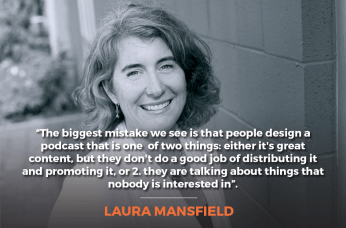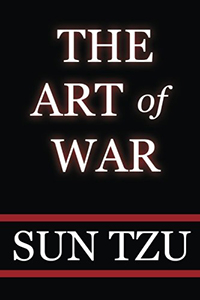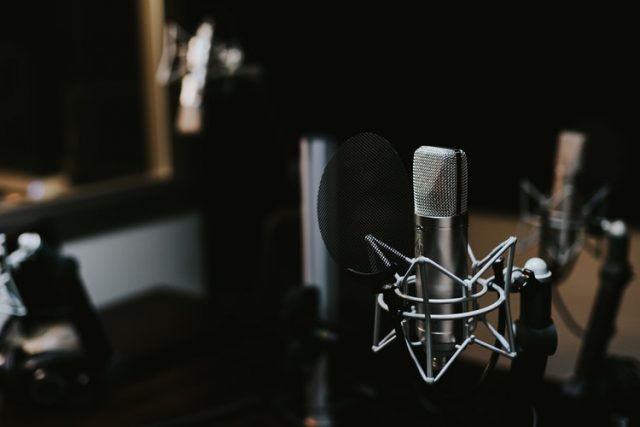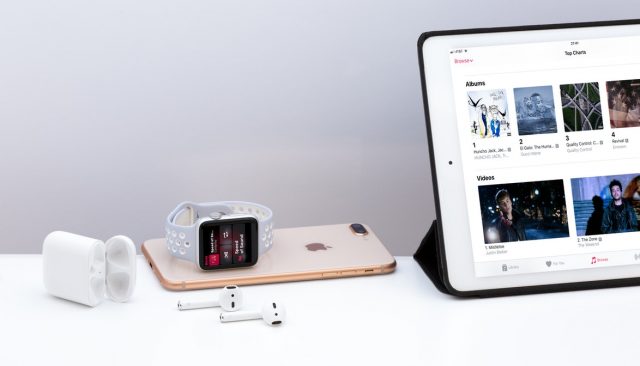Podcast creation and production might sound like a dream job. But trust me – it’s a lot of work. No one knows this better than Laura Mansfield. Laura is a podcast consultant who helps brands large and small establish themselves in the podcasting world. She knows firsthand about the struggles of podcasting and how difficult it is to get past that infantile state of development. Fortunately, Laura is here to share her wisdom. I was able to glean must-hear tips about podcast mastery, such as the main types of unsuccessful podcasts, how podcasting should fit into your content strategy, and how to handle remote interviews.

Transcript
I’m Stephan Spencer and you’re listening to Marketing Speak. In this episode, I am interviewing Laura Mansfield. So you’re going to want to listen to this episode because in this we’re going to hear some amazing tips, tricks, and techniques for taking your podcast to the next level. Now if you don’t have a podcast don’t worry because they’ll be tips for you as newbies as well. Now, this was an interview done in the hallway at Content Marketing World so it’s a little bit noisy and the sound quality isn’t fantastic but just bear that in mind, the content is worth it though, its killer. So without any further ado, here I am with Laura Mansfield.
Hey, It’s Stephan Spencer, I’m here at Content Marketing World with Laura Mansfield, and she’s going to talk to us about podcasting, how to leverage podcasting for your own business for your personal brand, tools to use, tactics, strategies, and so forth. Thanks for joining us today, Laura.
Yeah, I’m happy to be here.

So why you just start by telling us a little bit about yourself. How did you get into podcasting and what are you doing nowadays?
So I originally got into podcasting because I tried one with my husband, called Parenting and Pugs. It grew exponentially over a short period of time, and we felt like it would be a great opportunity to do something a little bit more with it. And I’m an entrepreneur, so I saw an opportunity to start a business and saw that really was a gap in people working with brands to help tell their story, so that’s the space we moved into with our company.
So you’re doing podcast consulting helping brands both large and small to establish themselves in the podcasting world.
Mmhmm. Absolutely. So we’ve actually come up with a process where we start with what we call an audio strategy. We actually help everyone from small businesses all the way up to big brands look at their content strategy and figure out how audio could complement that strategy, and we look at target audience and objectives and goals and story and really put together recommendations for them. We also do something called the audio algorithm which helps them look at how many folks they can get as far as listeners go that we would predict based on our past experiences. So we look at how they can get ROI as far as their audio investment in case they need to sell it up to higher-ups and that sort of thing. As far as smaller brands, individuals and small businesses, the vital piece in what we do is really having them look at what they would want to do with their podcast and what success would mean to them (versus just going out and doing a podcast and hoping everyone will listen to it). Instead, thinking intentionally upfront about how it fits into their overall content strategy. Because podcasting is going to work for some and not for others. It’s not going to be a one size fits all kind of thing.
What would be some of the biggest mistakes that you see folks making with their podcasting strategies? I totally get it when you talk about a strategy that has to underpin everything that you’re doing – not just go out there and do a bunch of tactics. In the Art of War, Sun Tzu said that “Tactics without strategy is the noise before defeat”, we don’t want to just go out there and make a lot of noise and not have anybody take us seriously or to be able to really achieve the kind of reach and ultimate outcome that we’re after. So what are some of the mistakes that folks are making specifically and how do we correct it so we nail it this time?
Tactics without strategy is the noise before defeat.
Good question. Podcasting, although it’s been around a long time is still a really young piece of content marketing and how people are approaching it is very immature right now. There are some that have had great success – you know, you look at Michael Stelzner and you look at Joe Pulizzi, and a number of other folks that have had a great success with building it as a part of their brand. But I think there is this assumption that that’s just going to happen and you’re not going to have to do intentional social media push for it and a thoughtful strategy around how you’re going to do distribution and promotion. So I think the biggest mistake we see is that people go out and they design a podcast and its one of two things: either it’s great content, but they don’t do a good job of distributing it and promoting it, or 2. they are talking about things that nobody is interested in and they have nobody to listen to their podcast. I actually find that happens less because the folks that aren’t as good at distribution and promotion oftentimes are really good at creating some amazing content, they just don’t know how to market themselves properly.
And interestingly enough I find some of the podcasts that are marketed really well and have grown – and I’m not saying this about Michael or Joe- but some of the podcasts they aren’t really good podcasts, they’ve just done a good job of getting themselves out there and interviewing the right people and getting their name known to get people to go and listen to that podcast. So I think the opportunity really look at that distribution and promotion of the piece and how you decide to get it out to the world and who are the people you are trying to listen to it. That’s another interesting and important piece – who are you trying to get to listen to it? Why are you doing this? I hear Joe speak in Portland last year and he talked about how “People are doing all sorts of content but that’s not necessarily a good move.” If you’re a company that’s a B2B company, why are you on Facebook, right? It’s the same for podcasting. Podcasting is really great if you have a deeper message and a deeper story to tell and you’re wanting to educate people and you’re wanting to build a personal brand around a certain topic – for individuals. For small businesses, it’s a great way to differentiate yourself and it’s inexpensive. As long as you have and know what your topic is and have a deeper meaning in what it is that you’re doing, it’s a good fit. If you’re creating widgets, it’s probably the greatest thing for you to do. It really depends if it’s a good fit or not. And the third thing is for bigger companies, it probably is a good fit because there is going to be a piece of content that they haven’t been able to express through a deeper story. Podcasting is a great way to tell that story and to bring on global experts and it’s simple and affordable.

I’m sure you’ve seen mistakes being made in folks choosing the wrong kind of format for their podcast whether they’re choosing to do a monologue and they’re just not that interesting, they should be doing interviews or people doing interviews and bringing on the wrong kind of guests, or they have poor audio setup and it sounds like it’s coming from a tin can, or they are way too long, they should be a half-hour but they’re an hour and a half and so-
Yeah, and that all comes from being strategic from the beginning. So, what are you trying to accomplish with your content? Who do you want to listen to? And if they’re listening, then be intentional in creating content that they are going to want to listen to. And don’t create content that — you know I think of that when we had a podcast that their target was parents. Parents that wanted to be – they wanted to reach parents that were outdoorsy – outdoorsy parents. They were doing content on things that were not appealing to those kinds of parents, so nobody was listening. It was a total disconnect between their brand promise and the content that they were putting out into the world. So we reframed that and started doing content all about “getting outside and I love dirt and geocaching and all these interesting things”. Their numbers went way up. It’s just thinking before you jump. I already did it today with somebody who started his own podcast and he said “I’ve done this, we’re going to use it to sell our new products, and I’ve done this. And I was thinking “Okay, pull back the reigns.” This is not about selling your new products. This is about providing interesting content that people want to listen to.
Podcasting is not about selling your new products. It is about providing interesting content that people want to listen to.
Absolutely. Alright, so let’s talk about tools for just a couple of minutes. What are some of the must-have tools for somebody who is just getting started, for someone with a small budget, for a medium budget – what are some of the must-haves and nice-to-haves that they should be surrounding themselves with?
Yeah, so I oftentimes when people are just getting started podcasting, I give a couple of really basic recommendations right away. Transom, that’s a really good place to go about getting gear, it really provides really good audio at a reasonable price. You could really go about getting a studio-in-a-box by buying from Transom — and I should have a strategic partnership with them because I recommend them all the time. They’re a great resource.
How much would that cost?
Depends. It could range from $300 to $1500-2000. When you look at the full investment, it’s not really that much.
When you say “studio-in-a-box”, do they really send you a box with a microphone –
Unfortunately, they don’t call it that. They should. They have different options for different kinds of podcasters. You can go on and you can look and you can pick from the basic to the middle package to the premium package. It’s pretty self-explanatory, it’s for people who are audio storytellers. Transom has a great kind of university that people go through. All of our producers are already required to go through that training when we bring them onto our staff. They’re really a great resource for people who are interested in improving and learning how to tell audio stories better.
Blogtalkradio is a really easy way to get a podcast started. I am not their number 1 fan because I don’t think the quality is high enough since you record it through your cell phone. That being said, I think it is great for people who have astrologers or yogis or meditation those types of things because you’re looking for content and you can share it easily and they have a pretty basic analytics package. Analytics are a struggle in podcasting; you have to be very intentional in who you work with. We built our own analytics when we first started in partnership with Spelunk and they were great, but we had to design it from scratch. Now we’ve moved into working with Libsyn, and they’re a great service as well. So you want to look at from the beginning how your studio (when I say studio I mean studio-in-a-box) is set up so it sounds good, you want to look at who is going to distribute you onto the different platforms, and you want to look at how you’re going to get your analytics back so can measure what it actually is what you’re doing. They actually do distribution and analytics, they’re a great service –
Analytics are a struggle in podcasting; you have to be very intentional in who you work with. Share on XAnd they distribute to places like other than the iTunes store – where else would be the places you want to distribute to? And where does Libsyn fit into that distributing?
So Libsyn does most of those platforms. The one platform they don’t do is Soundcloud. Soundcloud is really an up-and-coming platform they’re based out of Berlin, I believe they also have an office in the Bay Area. It is a great resource. I would make sure to also put your content on Soundcloud because they have great ways that you can embed to your social media platforms and you can track your analytics with Soundcloud as well. If you’re wanting to swing really basic, and this may be against many people’s recommendations, I would say even just starting on Soundcloud and getting it up and going on Soundcloud because it is just far more user-friendly than iTunes. iTunes doesn’t hate me for that but it’s true. iTunes is great, I mean, they’re the mothership. Most podcasts are on iTunes, and when they’re there, smaller networks will pull down, and networks are added every day. You have Soundhound, you have a bunch of networks now that are pulling from iTunes to fill out their podcast network. It’s a great place to be eventually; but when you’re starting, Soundcloud is a good way to go, and do it gradually.

And what about microphones and sound equipment? Do you use GarageBand? What’s your favorite microphone? What do you do when it’s somebody halfway around the world- do you send them a microphone the same brand and model and then they ship it back when the interview is done? How do you do that?
So we do that really easily. What we do is we’ll make recommendations – we’ll buy a package for them, off of Transom usually, and we partnered for a while with an audio provider in Portland, and found it was less to have our clients go through transom with us, so we’ll purchase a package for them that we deem necessary for what they need to do and we’ll either fly a team there to set up their studio or we’ll work with them remotely depending on what their budget is to help get that setup. Eventually, I want to set up a podcast series that tells people how to set up their own studio so that people can listen step by step and be able to follow.
We teach our clients how to fish.
But right now we’re pretty customized and we do a lot of handholding with our clients. And then after it’s set up, we basically have them record an mp3 file and have them send it to us and we do all the work from there, so we’ll post it out to all these platforms and we have a monthly fee that they pay. I mean, we’re a higher-end service provider, so they’re going to pay us more than they pay Libsyn or Blogtalk or whatever. We are definitely – you know a lot of our small business clients we kind of teach how to fish and we’ll provide the service for about a year and they’ll go off and do their own podcast after that. That’s happened with a number of our small businesses. Because it’s really not financially even a good investment to keep going with us after a number of years, because we’ve taught them how to do it themselves. They record the file, send it to us, and we send it out to the platforms and do analytics and provide them back analytics once a month to tell them how they’re doing and what’s going on and answering questions and also making recommendations about how they can grow their show.
Do you take podcasts and also publish it to YouTube with maybe Powerpoint slides to go with it?
We don’t do that now, and we don’t do that intentionally, because really we’re holding the space of an audio company. I know YouTube helps more with SEO and will do other things. We’ll do more SEO on the backend of when we tag the podcast, and really we want to stay with being an audio company. I know that we’re able to position our podcasts at a pretty high level just by the work that we do now with the tagging and with iTunes. iTunes comes up pretty high as well. So, no, to answer in a long-winded way. We did think about it. When Joe came out and said “what platforms are you on? What makes sense?” We really took our whole content strategy and we jointly decided that putting it on YouTube doesn’t make sense for us.
So going back how you interview clients who are in a remote location. Say they have their studio set up and they are going to interview somebody several states away. How’s that done? Is it done via Skype, or do you have a special microphone that you send them so the audio quality is better?
So we do it via Skype- sometimes the clients will have a microphone that they ship out prior to the interview – unfortunately the smaller clients kind of fly by the seat of their pants a lot, so they’re not far enough advanced to get the microphone to them, or if they Fedex it, they don’t want to pay the money to Fedex it, and so we’ve actually put together sheets of recommendations of things that they do. And so we have those available and they can do it or not kind of thing. The other piece that we do – in that same vein – we do have a show hosted out of Portland and Denver, and in that show, we have a host come to the studio in a box in Denver. So she’ll record them and then we link them in through Skype and it works pretty well. Sometimes they’ll bring in an interview from somewhere else in the country or internationally and we’ll link that person in as well. We do a lot of international recordings also. We’re able to run that through Skype, but we will make sure that they have the right equipment on the other end.
Audio quality is crucial.
It is. And we can pull people through our studio that are out. Unless it’s really bad, we can actually make it sound great. Like some interviews in little African towns where you can hear voices in the background and we’ve made it sound like they’re right in the studio. We are able to do that.
I used to live in New Zealand because I do an internet thing and you can live anywhere. I lived in New Zealand and stayed there for almost 8 years. I would do conference calls, there’d be a rooster crowing in the background because the first house we moved into came with chickens and a rooster. That’s kind of embarrassing.
It’s like, well, you can tell I’m not in Kansas. Or maybe Kansas has the same thing. Who knows.
Well, this has been great, I really appreciate your time and sharing your wisdom with us.
Important Links
Your Checklist of Actions to Take











About Laura Mansfield
 Laura Mansfield is a visionary who works to develop the vision and culture of large and small brands and companies. She is currently associated with Taproot Ventures.
Laura Mansfield is a visionary who works to develop the vision and culture of large and small brands and companies. She is currently associated with Taproot Ventures.
Laura Mansfield found her success as an entrepreneur after she found that her own podcast show, called Parenting and Pugs, had something that plenty of company podcasts lacked: a substantial listener base. She saw an opportunity to not only continue podcasting, which she loved doing, but help others achieve the same success creating great content as she did. That’s how she began a high-end audio storytelling consultant group that does more than distribute podcasting content.







Leave a Reply